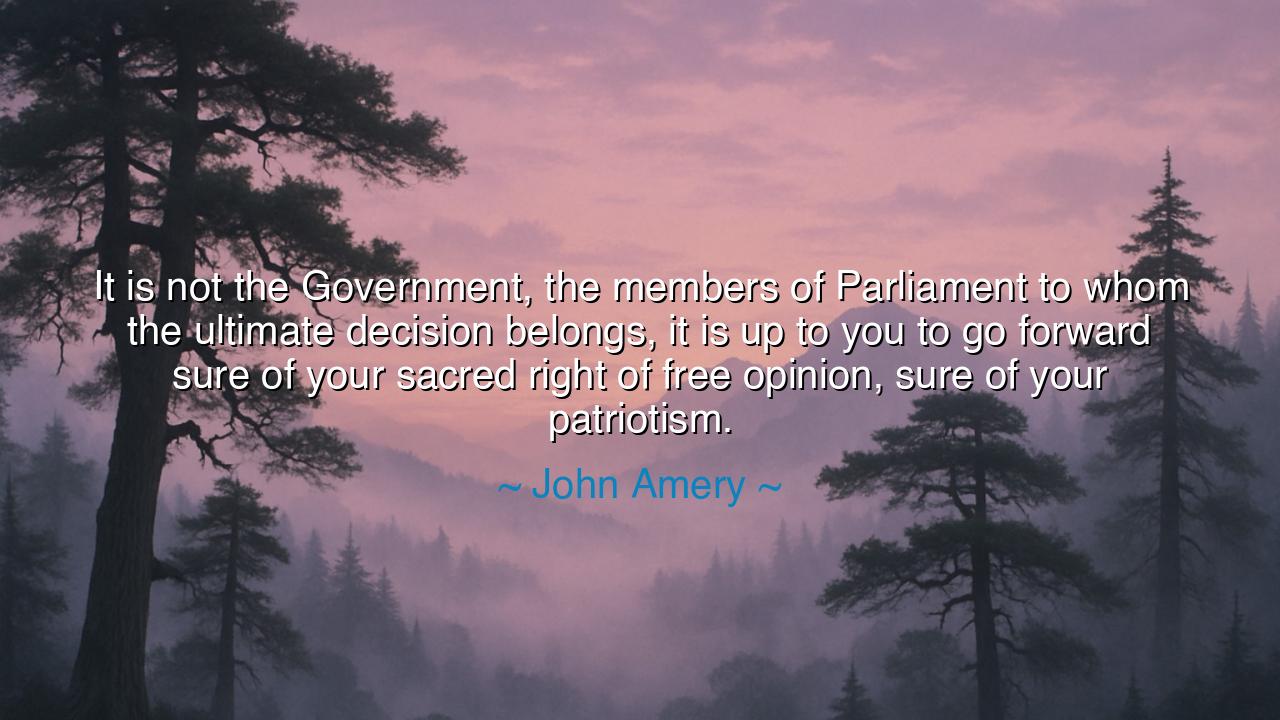
It is not the Government, the members of Parliament to whom the
It is not the Government, the members of Parliament to whom the ultimate decision belongs, it is up to you to go forward sure of your sacred right of free opinion, sure of your patriotism.






The words of John Amery—“It is not the Government, the members of Parliament to whom the ultimate decision belongs, it is up to you to go forward sure of your sacred right of free opinion, sure of your patriotism.”—speak with the voice of an ancient oracle, reminding us of the eternal truth that power, in its deepest sense, rests not in rulers or assemblies, but in the people themselves. For governments rise and fall, parliaments speak and dissolve, but the will of the people, forged in freedom and sustained by conviction, remains the foundation upon which nations endure.
Amery’s declaration places sacred weight upon free opinion. This is no ordinary privilege, but a right bestowed as a birthmark of human dignity. The ancients would call it the voice of the soul, the inner flame that no king can extinguish and no parliament can silence. A people that guards this flame burns bright with liberty; a people that neglects it sinks into the darkness of tyranny. To exercise one’s opinion, to speak one’s conscience, is therefore not merely a civic duty—it is a holy act, a defense of the divine spark of freedom.
At the same time, Amery invokes patriotism, not as shallow loyalty to symbols, but as the living bond between citizen and country. True patriotism is not blind obedience to leaders, nor the passive following of decrees. It is the courage of each individual to discern what is just, to love the homeland enough to question its course, and to guide it toward righteousness. The patriot does not surrender responsibility to governments or parliaments; he shoulders it himself, knowing that the health of the nation depends upon the vigilance of its people.
History itself provides countless witnesses. Recall the story of Mahatma Gandhi, who stood in defiance of imperial rule by urging Indians to claim their sacred right of free opinion. He led not through government mandate, but through the collective will of ordinary men and women who refused to remain silent. Their patriotism was not expressed in allegiance to rulers, but in allegiance to truth and justice. By salt marches, by nonviolent protest, by voices raised without weapons, they proved that the power of a people united in conscience surpasses the might of empires.
Yet we are also warned by darker examples. In Germany of the 1930s, many surrendered their free opinion to the will of the state. They traded conscience for conformity, truth for comfort, and patriotism for blind nationalism. The result was catastrophe on a scale history still mourns. The lesson is sharp: when people abandon their responsibility, when they believe decisions rest only in parliaments or governments, they invite ruin upon themselves and upon the world.
Thus, Amery’s words carry both inspiration and warning. They tell us that the fate of nations rests not in lofty chambers but in humble hearts. It is in the shopkeeper’s choice, the worker’s voice, the student’s protest, the mother’s refusal to accept injustice. Governments may legislate, but it is the people who breathe life into the laws, or allow them to rot. The destiny of a nation is written not by rulers alone, but by the courage or cowardice of its citizens.
The lesson for us, seekers of wisdom, is this: guard your free opinion as you would guard fire in the cold night. Do not surrender it to leaders who claim to know better, nor bury it beneath fear of standing apart. Practice patriotism not as passive loyalty but as active devotion—speaking truth, questioning falsehood, and shouldering responsibility for the course of your land. Each act of conscience is a stone laid in the foundation of freedom; each silence is a crack that weakens it.
So let us go forward, as Amery urged, sure of our sacred right, sure of our patriotism. Let us not wait for governments to decide the future, nor for parliaments to declare justice. Let each of us be the guardian of truth, the bearer of freedom, the voice of conscience. For in the end, the power belongs not to rulers, but to the people—and the people must never forget it.






AAdministratorAdministrator
Welcome, honored guests. Please leave a comment, we will respond soon